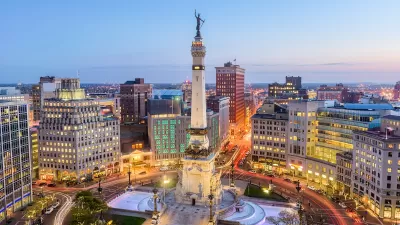As the Indiana Senate begins to consider whether to allow residents to vote on a tax referendum to expand mass transit in Central Indiana, Tea Party-aligned groups are trying to derail the legislation.
Chris Sikich looks at recent efforts by the Indiana chapter of Americans for Prosperity, and other groups, to derail "legislation that would allow residents to decide through a referendum whether to raise their income taxes by up to 0.3 percent to pay for most of the local portion of a 10-year, $1.3 billion transit expansion," in Central Indiana. "That tax would amount to roughly $10 to $15 per month for the average worker and would pay for most of the $700 million local share."
"Transit bill author Rep. Jerr Torr, R-Carmel, said he’s not concerned the opposition will derail transit at the Statehouse," notes Sikich. “All the General Assembly is being asked to do is give this option to local government and voters,” Torr said.
"The bill already passed the House by a 56-39 bipartisan vote, and so far has faced little resistance at the Statehouse. Passage by the Senate, though, is no guarantee."
FULL STORY: Metro Indianapolis mass transit plan to face opposition from Tea party

Alabama: Trump Terminates Settlements for Black Communities Harmed By Raw Sewage
Trump deemed the landmark civil rights agreement “illegal DEI and environmental justice policy.”

Study: Maui’s Plan to Convert Vacation Rentals to Long-Term Housing Could Cause Nearly $1 Billion Economic Loss
The plan would reduce visitor accommodation by 25% resulting in 1,900 jobs lost.

Why Should We Subsidize Public Transportation?
Many public transit agencies face financial stress due to rising costs, declining fare revenue, and declining subsidies. Transit advocates must provide a strong business case for increasing public transit funding.

Paris Bike Boom Leads to Steep Drop in Air Pollution
The French city’s air quality has improved dramatically in the past 20 years, coinciding with a growth in cycling.

Why Housing Costs More to Build in California Than in Texas
Hard costs like labor and materials combined with ‘soft’ costs such as permitting make building in the San Francisco Bay Area almost three times as costly as in Texas cities.

San Diego County Sees a Rise in Urban Coyotes
San Diego County experiences a rise in urban coyotes, as sightings become prevalent throughout its urban neighbourhoods and surrounding areas.
Urban Design for Planners 1: Software Tools
This six-course series explores essential urban design concepts using open source software and equips planners with the tools they need to participate fully in the urban design process.
Planning for Universal Design
Learn the tools for implementing Universal Design in planning regulations.
Smith Gee Studio
Alamo Area Metropolitan Planning Organization
City of Santa Clarita
Institute for Housing and Urban Development Studies (IHS)
City of Grandview
Harvard GSD Executive Education
Toledo-Lucas County Plan Commissions
Salt Lake City
NYU Wagner Graduate School of Public Service



























